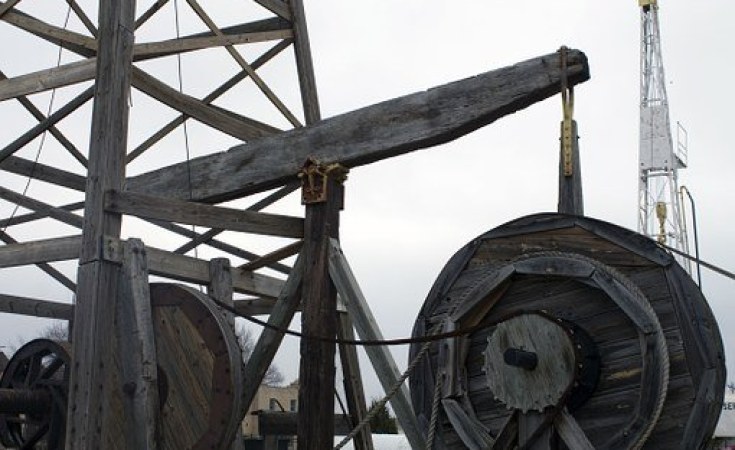Any company granted exploration and exploitation rights in the Democratic Republic of Congo (DRC) oil auction could find itself without financial protection, according to a report published today by Greenpeace Africa, Insure our Future, Reclaim Finance and Urgewald. If leading insurance and reinsurance companies follow their commitments and their general environmental, social, and corporate governance (ESG) policies, oil companies would struggle to find coverage for their environmentally and socially destructive business plans or it will be significantly more expensive.
"Companies planning to extract oil in the DRC, including in a war zone, are ready to sacrifice global biodiversity and climate goals, and disregard the rights of Indigenous Peoples and local communities, as well as concerns about corruption and illegality, " said Irene Wabiwa, International Lead of the Greenpeace Africa Congo Basin campaign. "Our analysis shows that the biggest insurers and reinsurers are reluctant to underwrite and lend essential support to such disastrous neocolonial extraction."
The report, "Blood oil - insuring the DRC oil exploration is underwriting the destruction of the Congo rainforest," analyses specific commitments by insurance and reinsurance firms regarding the oil and gas auction launched last year by the Democratic Republic of Congo (DRC), as well as their general ESG policies. According to the analysis, insurance and reinsurance for the oil blocks on offer will be prohibitively expensive for fossil fuel companies that win the auction, given shrinking property and casualty primary insurance and reinsurance capacity.
On the basis of in-person interviews conducted by Greenpeace Africa, the report demonstrates the risk of absent free, prior and informed consent (FPIC) of Indigenous Peoples and local communities in designated oil blocks. It also shares warnings by leading scientists regarding the biodiversity and climate impacts at stake, as well as concerns about war, corruption, illegality, and political instability in the country.
The DRC lacks domestic capacity to provide insurance for oil exploration and the high risk involved. Therefore, companies awarded exploration rights will most likely rely on the provision of services from some of the world's biggest insurance and reinsurance companies, mostly concentrated in Europe and North America.
Following direct communication by various Greenpeace organisations with leading insurers and reinsurers about these risks, the report shows that re/insurance companies have either explicitly excluded oil exploration and extraction in the DRC from their coverage or that it falls within their general restrictions. Among them are seven of the 20 biggest fossil fuel non-life insurance companies globally, including four out of the top five property and casualty insurers: Allianz, Axa, Chubb, Generali, Munich Re, Talanx Primary Insurance Group, and Zurich.
According to the report, four reinsurance companies (Munich Re, Hannover Re, Swiss Re and SCOR - which are estimated to have jointly collected over 40% of non-life gross written premiums globally in 2021) have withdrawn their reinsurance capacity. This will have implications for the reinsurance costs for companies (such as Perenco) willing to bid for exploration rights in the DRC's highly problematic oil blocks.
"Any insurance and reinsurance company opting for short-term profit at the expense of the world's climate, its biodiversity and communities inhabiting the rainforest, including in war zones, would be accomplice in crime with the companies bidding for oil," said Lindsay Keenan, European Coordinator of the Insure Our Future campaign. "While leading global (re)insurers' exclusions on insuring new oil and gas projects point the sector in the right direction, even these do not yet fully align with the Paris Agreement and basic human rights standards. All (re)insurance companies need to significantly and urgently upgrade their policies."
The report is published ahead of the Rendez-Vous de Septembre (RVS), one of the world's largest gatherings in the reinsurance sector, on the 9-13 September in Monaco. A Congolese community leader from Muanda (where Perenco is already accused of severe pollution) will be present, along with Greenpeace campaigners. They will be calling for firm commitments from AIG, Allianz, Axa, Berkshire Hathaway, Chubb, Fairfax Financial, Liberty Mutual, MAPFRE, Travelers and the UK's Lloyds of London not to underwrite oil and gas development in the DRC.
In September and October 2023, expressions of interest are due for 11 oil blocks in Tanganyika province. In two of these blocks that Greenpeace Africa visited, no local civil society organisation reported being aware of the auction. Only some members of fishing cooperatives had confirmed having heard of it, and they have expressed fear that benefits would go exclusively to local and national elites, while polluting the ecosystems they depend on.


